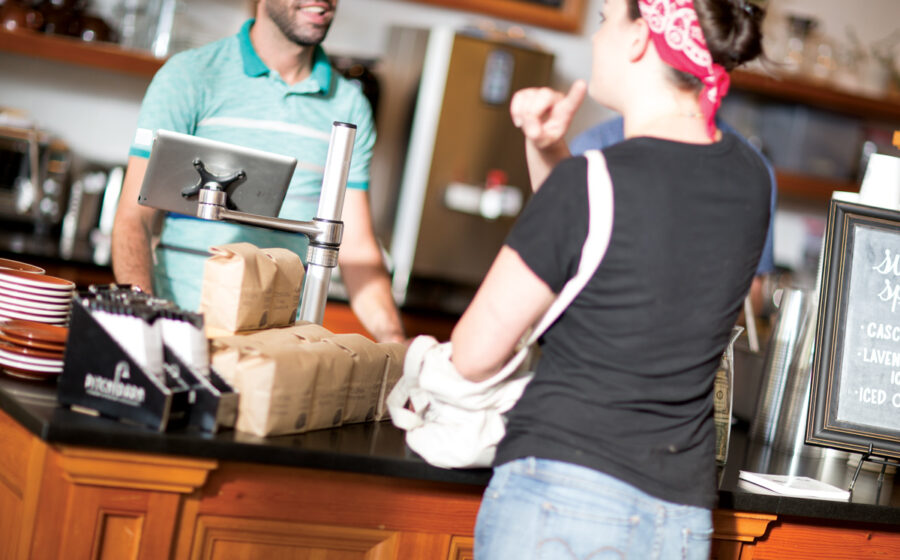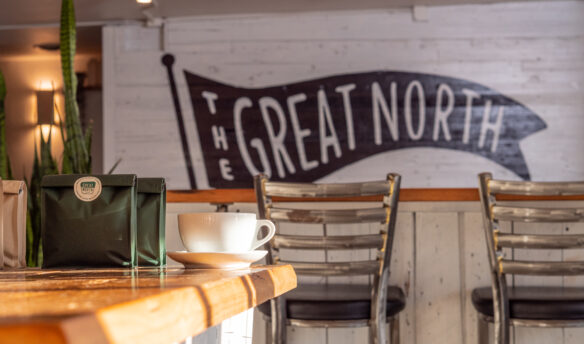[I]t’s 6:30 in the morning. You’re working the espresso machine at your cafe. The line is starting to build up as another barista, perhaps some with a newly discovered passion for coffee, is pitching a customer on a honey-processed Kenyan pour over option.
“The coffee has incredible intrinsic floral acidity instead of the everyday batch brew,” they say.
You love this coffee too. You’ve shared it to customers who, like this person waiting in line, had previously shown interest in adventurous coffees. But right now, the person behind her is looking at their watch and other baristas are getting frustrated.
“So, it has honey in it?” she asks.
The barista dives into the details again, going way deeper than this poor customer could follow. A customer at the back of the line leaves. By the time she agrees to try the coffee, probably feeling pressured into it, the person behind her is glaring at his phone and typing furiously. That could be a Yelp review. The other baristas are just as angry. This coworker potentially cost them tip money.
Does this scenario seem ridiculous? Or perhaps all too familiar? Baristas often have to balance and make quick decisions about when to educate customers—and when to simply serve coffee, and the skill to differentiate between these moments isn’t always intuitive.

As one of the co-founders of Onyx Coffee Lab in Northern Arkansas, I think about how to bridge the gap between providing customers with coffee in a familiar and inviting setting while allowing them to learn more about our approach to roasting and sourcing. Here’s what I’ve learned along the way.
The Fine Line Between Education and Over Explanation
The impulse to educate isn’t wrong. It’s in line with the growth in knowledge across every part of the coffee industry. There is an incredible gap between the amount of coffee consumed in our culture and the amount of information that customers have access to—why not extend that knowledge to customers at every opportunity?
Is this a good idea? Are customers open to learning? Do you sound like a jerk when you offer information on a new coffee with an esoteric processing method? It’s a fine line.
Educating consumers holds vast potential benefits: the foremost of which is loyalty to your coffee, company, or staff that can have a large impact on business and create repeat customers.
Learning the intricacies of taste or the social benefits of sourcing coffee directly from small farmers can result in someone not only visiting your establishment more often, but also sharing what they’ve learned with friends. This is essentially grassroots advertising.
A well-educated customer base also creates diversity in drink orders—the more a customer knows about the variety of coffee drinks available, the more likely they are to order them. This can make work more interesting and dynamic for baristas: passionate talk about tasting notes or coffee beverages becomes more natural. This can foster a culture of knowledge, openness, and refined taste.
Take Things Step-By-Step
It’s clear that engaged customers can benefit a business. But how do you get to that point?
The best way to start is to educate yourself in all things coffee and customer service. This might seem straightforward, but how you apply this knowledge leads to step two: know your customer. Knowing more about the customers that step through your door means you can apply the knowledge you’ve accumulated and apply it in a way that’s meaningful to your community.
Most customers will only be able to take on new facts or try new things incrementally. A customer who orders a mocha everyday isn’t suddenly going to be persuaded to try a delicate coffee brewed on a V60, but maybe they’d be open to trying a mocha made with a single-origin espresso that pairs well with chocolate.
Maybe in a few months they’ll try a cappuccino—but maybe they won’t and they’re perfectly happy with their delicious mocha. You need to be ready to talk about coffee in as much or little depth as each customer and situation warrants, and having a good customer service philosophy will help guide you there.
A few quick and easy conversations about coffee can turn into real, in-depth relationships with customers.
Coffee Education 2.0
For deep dives into coffee, it’s often useful to engage customers in a different forum than the typical over-the-counter exchange. At Onyx, we’ve seen success in public tastings (which have been limited due to COVID-19) or online events.
These kinds of events attract customers who are interested in learning about coffee enough to commit time outside their regular morning routine. Using this avenue can create a comfortable environment for you to discuss coffee in detail while allowing customers to learn and ask questions. Education can also be part of your business model: in the past, we’ve also offered a few in-depth, fee-based classes. In my experience, these classes have great results and usually create not just regular customers, but friends of the shop who are excited and ready to try new things.
Social media is another great place to create discussions around coffee. Folks can comment and ask questions about new offerings without feeling intimidated or rushed if they’re in line at the cafe. Online, your attitude should be one of inclusion where customers have the choice to participate.
Using your menu to broaden horizons is also useful. Try offering the same coffee on two different brewing methods, like espresso and drip. Juxtaposing the two opens up a dialogue for customers to note the differences and can help curious coffee aficionados find the right brew method for their favorite bean. Interesting coffee-based drinks can help customers view coffee in a new way by seeing coffee as an ingredient that adds a new flavor to the drink.
But fundamentally, the easiest way to create an environment where customers can learn about coffee is to be friendly, open, and to offer appropriate information based on who you are talking to. No one wants to be lectured, told they are wrong, or discouraged from enjoying their favorite drink.
As coffee professionals, it’s hard not to share the passion we have for coffee with our customers. But only when we start to view ourselves from the customers’ side of the counter can we really make strides to share coffee knowledge thoughtfully.
Jon Allen is the co-owner of Onyx Coffee Lab in Springdale, Arkansas. Photos by Cory Eldridge.
This story was originally published on August 10, 2015 and has been updated and edited to reflect Fresh Cup’s current editorial standards.







